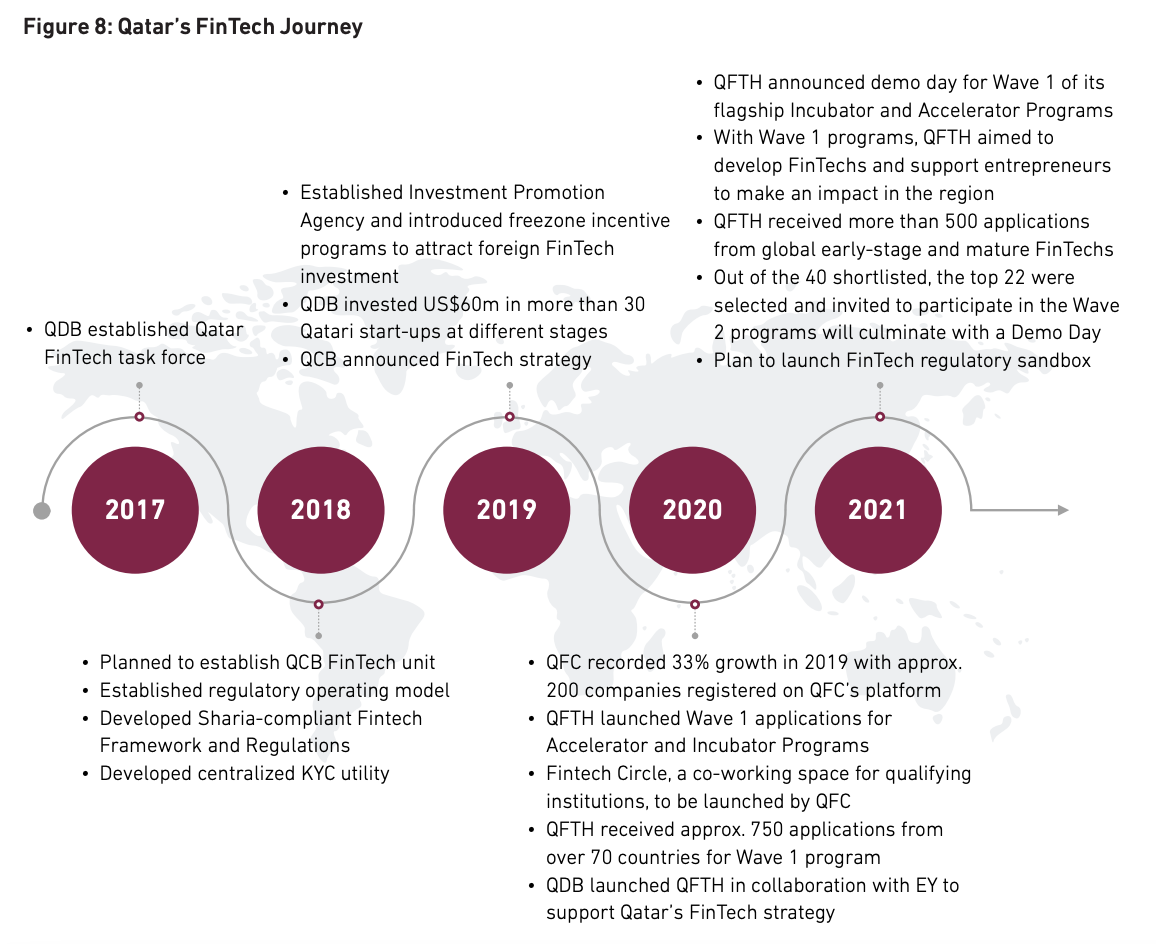Striving to turn the country into a major fintech hub, the Qatar government has introduced a number of programs and initiatives to support local startups and entice international fintech companies to set up shop domestically and choose the nation as their launchpad for the global market.
These ambitions were shared in a 2021 whitepaper by the Qatar Fintech Hub, an initiative by Qatar Development Bank (QDB). The report, titled From Qatar to the World: A report on the state of Fintech in Qatar, provides a holistic review of the local and regional fintech market, delving into the recent developments which have occurred in the sector and sharing the main growth drivers of fintech in Qatar.
According to the report, Qatar’s mature financial services industry, coupled with national initiatives to support digitalization, access to capital and market opportunities, is setting solid ground for fintech to thrive.
Qatar’s fintech initiatives
Viewing fintech as potentially one of the biggest engines of Qatar’s future economic growth, the government has committed to helping establish a favorable environment for financial technology to develop.
This was formalized with the launch of the National Fintech Strategy by the Qatar Central Bank (QCB), an initiative that seeks to facilitate the growth of the fintech sector by nurturing startups and supporting established companies with significant potential for growth.
The strategy aims to support this burgeoning sector in partnership with several local stakeholders, including QDB, and the Qatar Financial Centre (QFC).
QFC, a financial services free zone in Doha, has set out to becoming a hub for banking and finance, fintech, digital, as well as sports and media. This has been done by offering fintech companies incentives including the waiver of the application fee of US$5,000 and the first-year annual registration fee of US$5,000 for qualified fintech companies. Qualified firms also get free access to the QFC Fintech Circle co-working space for the first year.
As of 2019, more than over 800 fintech, IT, tax and investment consulting firms were based out of the freezone. That number is projected to rise to 1,000 this year.
As of QDB, the bank has established the Qatar Fintech Hub, an initiative focusing on connecting other like-minded hubs, organizations, and regulators from across the world, incubating domestic fintech companies, and supporting foreign fintech companies to invest and grow in the region.
In 2020, the Qatar Fintech Hub introduced its fintech incubator and accelerator programs. The programs are designed to support the growth of the fintech industry by providing promising startups with financial support, bespoke mentoring and training services, as well as partnership opportunities with top financial institutions from across the region.
So far, the programs have been rather successful, attracting more than 500 applications from around the globe each year. They are now entering their fourth edition.
These recent initiatives followed other supportive moves made over these past couple of years.
Qatar’s fintech journey started back in 2017 with the establishment of the Qatar Fintech Taskforce by QDB, QCB, QFC and various financial institutions operating in the country. This was followed in 2018 with the development of the Shariah-compliant Fintech Framework and Regulations, and in 2019 with the establishment of the Investment Promotion Agency and the introduction of freezone incentive programs to attract fintech investment.
Last year, Qatar soft-launched its fintech regulatory sandbox, allowing companies to test out innovative products in a controlled environment. As of March 2022, three fintech companies were part of the program, Alanood Abdullah Al Muftah, Head of the Fintech Section at QCB, told The Peninsula in March 2022. More companies are currently being evaluated to enter the sandbox, which is set for an official launch soon.

Qatar’s fintech journey, Source: From Qatar to the World: A report on the state of Fintech in Qatar, Qatar Fintech Hub, Oct 2021
The central bank is now reportedly investigating the possibility of launching a digital currency and issuing digital banking licenses.
Growth drivers
Compared to the United Arab Emirates (UAE) and Saudi Arabia, Qatar has a much smaller and lesser developed fintech sector. This is despite the many opportunities that the market has to offer to companies in the space.
For one, booming e-commerce activity and rapid adoption of digital payments triggered by the COVID-19 pandemic are setting the foundation for further growth with big opportunities in areas including online remittances, contactless payment solutions, remote processing of insurance claims and payments, and small and medium-sized enterprises (SMEs) lending, the report says.
In addition, Qatar offers diverse sources of funding, including venture capital (VC) firms, angel investors, and government-backed programs. QDB, for instance, operates a US$100 million VC fund helping support promising startups. Other avenues for capital also exist including public funding bodies such as the Qatar Business Incubation Center (QBIC) and the Qatar Science and Technology Park (QSTP).
Finally, the presence of large and established financial institutions in the country means that Qatar has the pool of domestic talent necessary for the fintech sector. Additional steps have also been taken to attract and retain the best talent, taking the form, notably, of collaborations with local and foreign universities.
Featured image credit: edited from here and here








No Comments so far
Jump into a conversationNo Comments Yet!
You can be the one to start a conversation.